|
|
|
Sort Order |
|
|
|
Items / Page
|
|
|
|
|
|
|
| Srl | Item |
| 1 |
ID:
116551
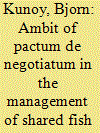

|
|
|
|
|
| Publication |
2012.
|
| Summary/Abstract |
The United Nations Convention on the Law of the Sea provides for a mechanism pursuant to which coastal States, having an interest in the fishery of a shared fish stock which straddles its maritime areas under national jurisdiction is obligated to undertake negotiations on joint conservation and management measures with the other relevant coastal States. Despite the evident benefits which arise from a joint conservation and management agreement, which can maintain or restore stocks to levels that can produce the maximum sustainable yield, such negotiations often prove difficult. However, relevant coastal States are inclined for self-interest purposes to seek to maximize their allocation which may lead to a stalemate, from which complex legal questions arise, given that the obligation to seek to agree on a conservation and management measure is an obligation of conduct, as opposed to result.
|
|
|
|
|
|
|
|
|
|
|
|
|
|
|
|
| 2 |
ID:
116550
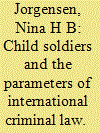

|
|
|
|
|
| Publication |
2012.
|
| Summary/Abstract |
The law on the enlistment, conscription or use of children under the age of 15 to participate actively in hostilities has been addressed in the jurisprudence of the Special Court for Sierra Leone and in the first judgment of the International Criminal Court in the case of Thomas Lubanga Dyilo. This article examines the parameters of the international criminal law relating to child soldiers, focusing on the conduct element of the three modes of committing a child-soldier-related offence. Two main issues are addressed: whether Articles 8(2)(b)(xxvi) and 8(2)(e)(vii) of the 1998 Rome Statute describe two or three separate categories of conduct and whether sexual violence may constitute a form of use in hostilities. These issues are discussed within the framework of the prior evolution of the law and the unfolding practice of the International Criminal Court.
|
|
|
|
|
|
|
|
|
|
|
|
|
|
|
|
| 3 |
ID:
116552
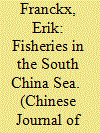

|
|
|
|
|
| Publication |
2012.
|
| Summary/Abstract |
The present paper intends to have a look at fisheries in the South China Sea in order to find out whether this particular issue is a problem solver or rather a problem creator in this region characterized by tense inter-State relationships at present. In this part of the world's ocean, dominated by maritime features such as the Paracels and the Spratleys, i.e. shallow areas, sometimes drying only at low tide, and sometimes at high tide as well, fish is a plentiful resource relied upon by many fishermen of the surrounding countries as a source of income. If we take Europe as an example, fisheries seem to have the dual capability to either trigger disputes between States, resulting sometimes in outright fish wars, or to provide a means of furthering integration between States, such as has been accomplished by the European Common Fisheries Policy. In the South China Sea a similar duality can be witnessed. At times, fishermen have dramatically influenced the relations between certain States to the point of suddenly straining diplomatic relations totally disproportionately to the event which had triggered a particular incident. But fisheries are also used as a vehicle for trying to further co-operation on both bilateral and regional levels. Indeed, very often fisheries are seen as a more "neutral" area able to stimulate co-operation more easily than, for instance, co-operation in the military field or on sovereignty-related issues. This paper will conclude by determining whether Article 123 of the 1982 United Nations Convention on the Law of the Sea adds any legal obligation to the riparian States of a semi-enclosed sea in this respect.
|
|
|
|
|
|
|
|
|
|
|
|
|
|
|
|
| 4 |
ID:
116553


|
|
|
|
|
| Publication |
2012.
|
| Summary/Abstract |
In State practice, it is common for coastal States to claim maritime geographic features based on the principle of "land dominating the sea". International law recognizes such State practice as long as the related claims are consistent with the applicable international legal norms and rules. While it is relatively clear and recognizable that coastal States have the right to claim geographic features above the water, it remains controversial and unclear whether coastal States could have the right to claim submerged geographic features. It is the purpose of this article to discuss the issues concerning the claims to maritime geographic features to see whether a clearer way can be found to sort out the issues or whether these issues will remain a conundrum to international lawyers as well as to the whole international community.
|
|
|
|
|
|
|
|
|
|
|
|
|
|
|
|
| 5 |
ID:
116554
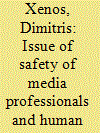

|
|
|
|
|
| Publication |
2012.
|
| Summary/Abstract |
Attacks against media professionals and human rights defenders do not only harm the individual victim but the whole society. In the system of the UN Human Rights Committee (HRC), the issue of the legal protection of these groups of individuals has essentially been equated with the protection of the main civil forces which influence domestically the achievement of the democratic values and objectives that are enshrined in the International Covenant on Civil and Political Rights. In the supervision of a State's compliance with the treaty, the HRC builds on and expands its existing jurisprudence on violence against the individual by increasingly developing and improving a multilevel framework of the State's obligations that extend to critical procedural safeguards. Given the stakes involved, the legal protection of media professionals and human rights defenders has become a key case-study of effectiveness and rigour of every international law system of human rights.
|
|
|
|
|
|
|
|
|
|
|
|
|
|
|
|
| 6 |
ID:
116555


|
|
|
|
|
| Publication |
2012.
|
| Summary/Abstract |
The Treaty of Amity and Cooperation (TAC) is a foundational treaty by the Association of Southeast Asian Nations (ASEAN) to establish a code of conduct to govern inter-State relations in Southeast Asia. ASEAN has actively encouraged non-ASEAN States outside Southeast Asia to endorse this code of conduct by acceding to the TAC. This article examines the nature of accession by two non-ASEAN States, Australia and the USA, particularly their interpretative positions in relation to the TAC provisions on the prohibition against non-forcible intervention. It underlines the differences in which ASEAN, Australia and the USA understand the TAC's obligations. Whereas ASEAN has developed the TAC as a regional code of conduct inter se, Australia and the USA have been disinclined to accept the regional code of conduct and have made forceful attempts in their accession materials to influence the core meaning of the prohibition against non-forcible intervention.
|
|
|
|
|
|
|
|
|
|
|
|
|
|
|
|
| 7 |
ID:
116549
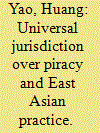

|
|
|
|
|
| Publication |
2012.
|
| Summary/Abstract |
In recent years, the UN Security Council and General Assembly resolutions on piracy repeatedly reiterated the use of universal jurisdiction to combat piracy. This article expounds the conceptual and application limitations of universal jurisdiction over piracy, and, from the three dimensions of universal jurisdiction (prescription, enforcement and adjudication), examines the relevant practice in East Asia. The author finds that universal jurisdiction is an indispensable tool in deterring, preventing and responding to pirate attacks, and that the implementation of universal jurisdiction in East Asia should be strengthened in the future by, among others, reforming domestic law to criminalize piracy and establish universal jurisdiction and by enhancing co-operation in prosecuting pirates, as well as by further advancing comprehensive and in-depth co-operation in law enforcement.
|
|
|
|
|
|
|
|
|
|
|
|
|
|
|
|
|
|
|
|
|